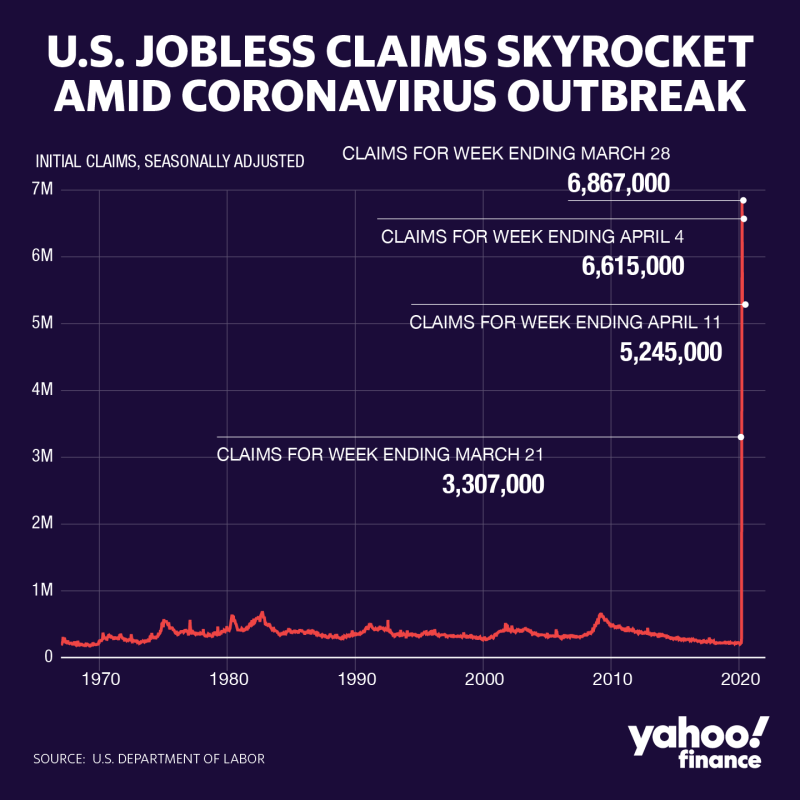Trump faces an Obama problem on the economy
In 2014, President Obama was eager to tell voters how well the economy was doing after a searing recession. In several speeches, he declared the economy was “booming,” while bragging of a “record stock market, record corporate profits, 52 months of consecutive job growth.”
Voters disagreed, and dealt Obama’s Democratic party a devastating blow in that year’s midterm elections. Republicans seized control of the Senate and secured the strongest majority in the House since 1928. Obama described the outcome as a “shellacking” and acknowledged he had overstated the strength of the economy. "Over the last two years we have made progress," he said, "but clearly too many Americans haven't felt that progress yet and they told us that.”
[Check out other episodes of the Electionomics podcast.]
President Trump now faces a similar danger, as he presses to free an economy suddenly shackled by the coronavirus pandemic. Trump’s reelection in November hinges on reopening the economy and repairing some of the damage caused by widespread business shutdowns, 22 million lost jobs and trillions in lost stock market wealth. Yet Trump’s penchant for sugarcoating problems suggests he may tell voters things are better than it seems to them.
Mattie Dupler of Forward Strategies and the National Taxpayers Union tells the Yahoo Finance Electionomics podcast that “the challenge for the president now is he doesn’t want to end up like President Obama in 2013 and 2014, where all of the bean counters in Washington said look at the charts, we’re in the throes of an economy recovery. While that was true in the northeast corridor, the rest of the country didn’t feel that way and we saw that in midterm shellacking. The rest of the country really felt like their circumstances were not reflected in the narrative being told in Washington.”

While unemployment has soared during the last four weeks and consumer confidence has crashed, it’s still unclear how voters will feel in the fall as they’re preparing to vote. Aid from Washington is cushioning the economic damage for now, by helping companies without revenue pay their bills and giving the newly unemployed some extra spending money. That’s not open-ended, however, and voters could get panicky if the coronavirus recession drags on with no sign of a recovery.
Trump and some conservatives are pushing hard to “reopen” closed businesses by May, but it’s not clear how that can happen without risking a new wave of infections and deaths that would force governors to close businesses all over again. Trump has promised a reopening plan but so far there isn’t one. Governors are developing their own criteria, but they mostly foresee a very gradual emergence dependent on widespread testing for the virus. And for now, the nation is woefully short on tests.
Dupler worries about smaller businesses that employ the vast majority of Americans and have far fewer resources than Fortune 500 companies. Many of those firms are benefiting from loans guaranteed in the latest stimulus bill, but they’re still likely to struggle with an economy coming slowly back to life. “What I’m most worried about,” Dupler says, “is employers having to lay off their work force, and when there’s a resolution, having to rehire and retrain all these workers. They might not have a plan in place for how you slowly scale up after an epidemic of this proportion.”
Businesses, like individuals, will be taking cues from Trump about what to expect, while also judging whether Trump’s messaging reflects reality around them. “If the president wants to get a handle on this message,” Dupler says, “he needs to be cogent, he should make a direct appeal to people to follow the CDC guidelines, and then he should work in collaboration with state leaders who by all accounts are doing a pretty good job here.” Trump, of course, hasn’t always played nice with governors, especially Democratic ones. He may now need them more than he realizes.
Rick Newman is the author of four books, including “Rebounders: How Winners Pivot from Setback to Success.” Follow him on Twitter: @rickjnewman. Confidential tip line: rickjnewman@yahoo.com. Encrypted communication available. Click here to get Rick’s stories by email.
Read more:
Follow Yahoo Finance on Twitter, Facebook, Instagram, Flipboard, SmartNews, LinkedIn, YouTube, and reddit.
